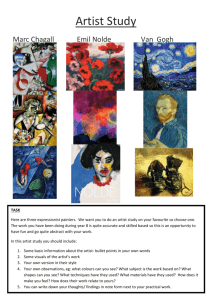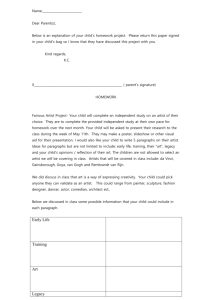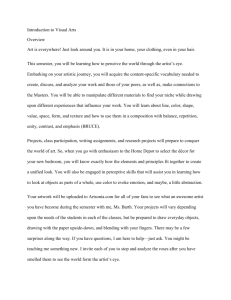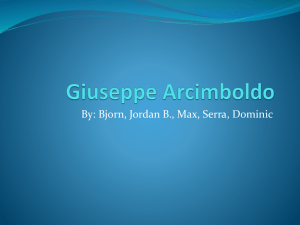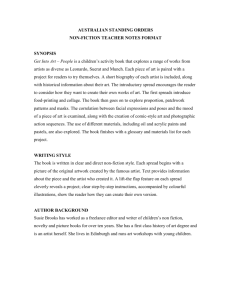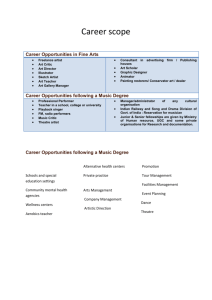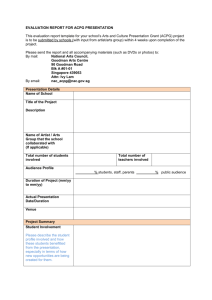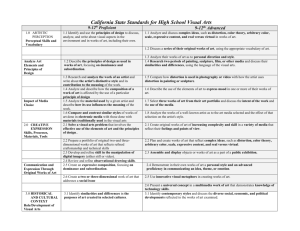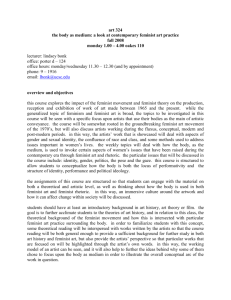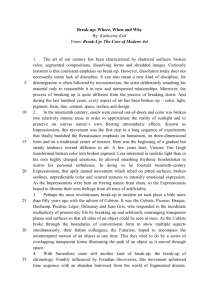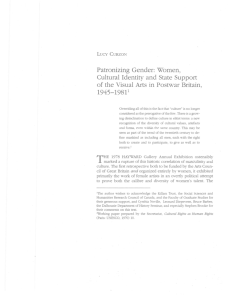Cathy de Monchaux Interview Transcript Is this what you imagined
advertisement
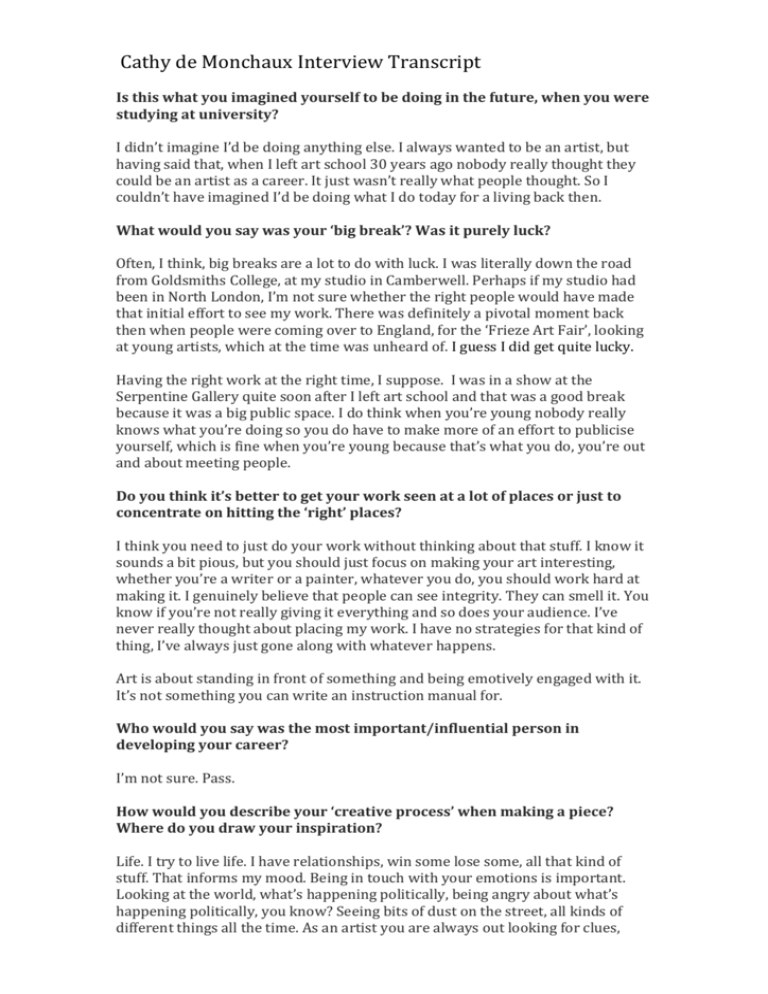
Cathy de Monchaux Interview Transcript Is this what you imagined yourself to be doing in the future, when you were studying at university? I didn’t imagine I’d be doing anything else. I always wanted to be an artist, but having said that, when I left art school 30 years ago nobody really thought they could be an artist as a career. It just wasn’t really what people thought. So I couldn’t have imagined I’d be doing what I do today for a living back then. What would you say was your ‘big break’? Was it purely luck? Often, I think, big breaks are a lot to do with luck. I was literally down the road from Goldsmiths College, at my studio in Camberwell. Perhaps if my studio had been in North London, I’m not sure whether the right people would have made that initial effort to see my work. There was definitely a pivotal moment back then when people were coming over to England, for the ‘Frieze Art Fair’, looking at young artists, which at the time was unheard of. I guess I did get quite lucky. Having the right work at the right time, I suppose. I was in a show at the Serpentine Gallery quite soon after I left art school and that was a good break because it was a big public space. I do think when you’re young nobody really knows what you’re doing so you do have to make more of an effort to publicise yourself, which is fine when you’re young because that’s what you do, you’re out and about meeting people. Do you think it’s better to get your work seen at a lot of places or just to concentrate on hitting the ‘right’ places? I think you need to just do your work without thinking about that stuff. I know it sounds a bit pious, but you should just focus on making your art interesting, whether you’re a writer or a painter, whatever you do, you should work hard at making it. I genuinely believe that people can see integrity. They can smell it. You know if you’re not really giving it everything and so does your audience. I’ve never really thought about placing my work. I have no strategies for that kind of thing, I’ve always just gone along with whatever happens. Art is about standing in front of something and being emotively engaged with it. It’s not something you can write an instruction manual for. Who would you say was the most important/influential person in developing your career? I’m not sure. Pass. How would you describe your ‘creative process’ when making a piece? Where do you draw your inspiration? Life. I try to live life. I have relationships, win some lose some, all that kind of stuff. That informs my mood. Being in touch with your emotions is important. Looking at the world, what’s happening politically, being angry about what’s happening politically, you know? Seeing bits of dust on the street, all kinds of different things all the time. As an artist you are always out looking for clues, visual, emotional, different things about the world that appeal to you. I’m always fascinated by buildings that are being demolished. I’ll just stand there for ages; I love looking at them. It always starts with things I’m thinking, life I’m living. I write a lot. I wait a lot, then I’ll wake up one morning and draw a little picture of something and then maybe two years later I’ll end up making something a bit like that little picture. I keep a book that I sketch and write in. I write more than I draw. For me writing is a pleasure because I don’t have to show it to anybody, so I can say anything. That then becomes the work, in a different way later on. Are you worried about the increasing mergence with technology? How do you think makers like yourself, will be affected? I think there is room for everything in the world. I think technology has a place, even within my practice there are things that I do, like getting things laser cut, images printed. I’m not a complete Luddite. For me, it’s interesting that I make work that appears that it has been made by hand, even if it wasn’t necessarily my hand, if I’ve used an assistant sometimes. I want my work to have that appearance. I’m not worried about technology. I think it’s really exciting to live in a time of such dramatic change; when I left art college there weren’t computers or mobile phones. Your practice is constantly evolving and you have recently taken a “sabbatical” from the art world. Do you feel you’ve reached the next stage in your practice? Is there anything pipelines? At the moment the work is in the pipeline, but I’m slightly resisting worrying too much about where it goes at the moment. Which is unusual, because it’s about at this point where I usually start thinking, ‘I need a deadline’, but actually it’s been quite interesting to not be thinking that. I think, as an artist, you get driven by all sorts of different demons. Producing work for the art world, as it is now, is a very commercial thing. It’s very money driven. It’s not really about things that I’m interested in; it’s more about making a product very similar to the last one and selling it for millions, and I don’t find that terribly interesting. Probably for the first time in my life I’m not thinking, ‘I must have this deadline, I must make work for this show.’ I just want to have the work that hasn’t been driven by any deadline. Creativity is often helped by a deadline; because it pushes you to challenge your emotions make you a little more adventurous, because you know you have to get something done. It’s been nice to go slowly for once. It’s a nice position to be in, and I’m very lucky to be in it. I don’t need to make much work to survive, and that is a real privilege, so I can say no to things that I don’t need to do to get by. But again, as an artist, there is a part of you that needs an audience. You think, I must have some humans looking at my work again, you know? It’s boiling in the pot. Who do you make your art for? I make my work for a fictional audience that’s in my head. But having said that, I have been enjoying this time having a ‘them’ in mind, knowing that there is an audience I am trying to talk to. I’m trying to make my work so that when people stand in front of it, it’s about them, and not about me. Have you been involved in much artistic collaboration? Have you ever considered working with a moving image artist, for instance using your models or scenery pieces in a stop motion animation? I haven’t considered working with an animator. The only collaboration that I’ve really done was with musicians. A guy called Vince Clarke, from Erasure, and Martin Webb from Heaven 17. They developed this 3D soundscape system and were looking to work with artists to try to do something visual with it. The technology was new back then, but basically it was a system where you could design sounds so that the speakers would be in the corner of the room, but the sound would be [here] in the middle of the room, you could physically move the sound. So you could have physical conversations in the space, as if there were three different people but actually, there’s nobody there. So we did this collaborative project with my work, and my writing and lots of different chanting from around the world, religious calls to prayer, and the guys mixed that all up and made it work. Actually, I did another collaboration with Peter Gabriel, which I guess was a very early computer game. That was with Helen Chadwick, and Yayoi Kusama. It was kind of nice because none of us really knew what we were doing. It was some weird music of Peter’s and our art mixed in with this computer game technology, which was very new at the time; but then the company who was making the game bottled it and changed the ideas so it became neither art nor music, or even a proper game in the end. It wasn’t even that long ago, maybe 1996? It seems crazy now. Which Artists inspire you now? I think a lot of people influence and inspire you. It’s often the dead artists really that give you some perspective. The problem with contemporary artists, I think, is that as an artist you are quite arrogant, in a way. You’re always thinking about your own job. When I gaze at someone else’s art, someone that is my contemporary, you are almost looking for what’s wrong with it. Not in a horrible way, but objectively, you are always looking to improve your own work so you end up unpicking the work of others to see what’s bad and what’s good. You are almost trying to find fault with it, so you can understand how to make it better. Which I suppose means that any person’s artwork is influential because you are always measuring yourself against them. Not to say what I do doesn’t have massive holes in it, but you are always trying to figure out what works. I wouldn’t say I’m in love with another contemporary artist’s work, but that’s not to say I don’t respect or learn from many of them. Last night you said you would call yourself feminist, but perhaps not a conventional one? How much does this influence your work? Yes, I was wondering about that this morning, ‘what was I talking about last night, rubbish probably’, I think I was a bit tired. It was probably because there is a kind of stereotype nowadays of a feminist being this annoying, strident female person that nobody really wants to engage with. Which in truth was a bit before my time, in terms of being an adult. It’s hard to imagine now, but say for instance with my mother’s generation, in the early seventies they really had to fight to get the men that they lived with to do the washing up, you know, quite straightforward household tasks that were perceived to be ‘women’s work’. Both my parents went to work, but my mother would come home and feed all the children, clean up after them, shop for them, etc and my dad didn’t do any of those things. Occasionally she would point out the sink, and luckily for her my dad would be thinking, ‘Oh, I got away without doing that for a while’, so women had to be very assertive about it. There was this sort of ‘bra-burning’, very strident image of feminists at the time, which always seemed a little contemptuous to me. But obviously a feminist, in the true sense, is someone who believes in equality, so on that level yes, I am a feminist. If there were one piece of advice you would give to art students today, what would it be? Having integrity and trusting your instincts. I think being an Artist is quite a weird thing to be. They are quite a special breed. I mean if you go back to the time of cave painters, they were the ones who weren’t allowed out because they would have been eaten really. They were probably told, ‘You go to the back the cave and make spells, draw on the walls and don’t interrupt us. Keep away the evil spirits – that can be your job’. But there must have been a worth for the artists back then. For any Artist, you have to have faith that being a bit odd goes with the job description. It’s alright if you are strange.
